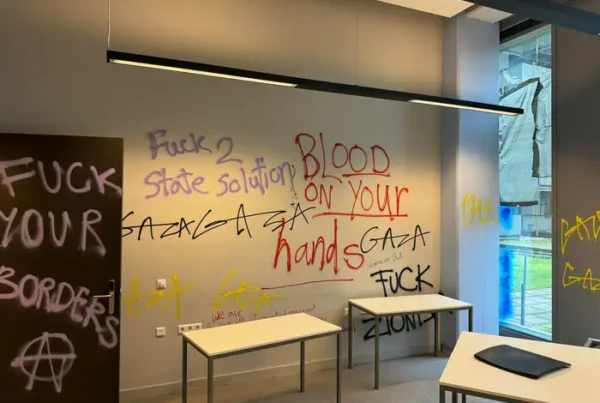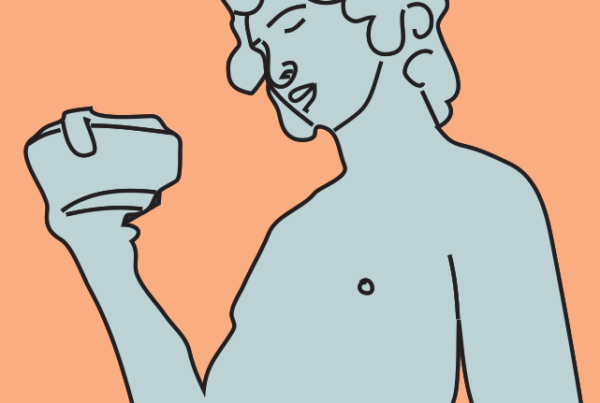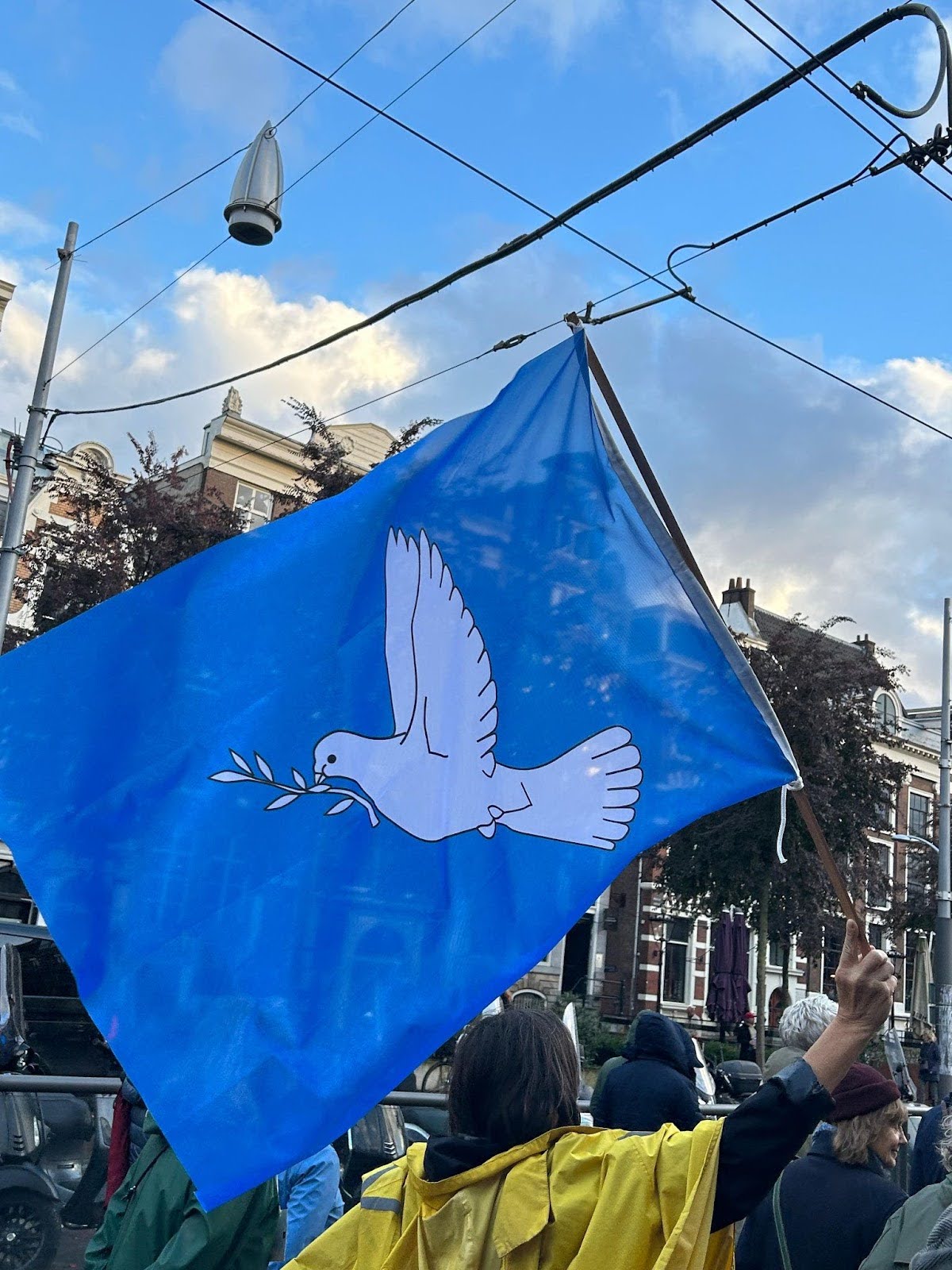
Statement from the author:
This article is part of a series on the pro-Palestine protests that recently happened on campus. The aim of this series is to give readers an insight into the events of the protests, and the different people and groups that were involved. I am aware that each individual has their own nuanced set of opinions and views on the protests, as well as on the conflict itself. I therefore want to ask you, the reader, to view this article as just one sample from a large pool of diverse individuals, that might not be representative of any group. Furthermore, I am not expert enough to comment on the truth of any of the statements made, and I did not write about them because they reflect my own opinion. Instead, I wrote this article because I believe that it is interesting and valuable to understand as many perspectives on these events as possible. While my questions and writing are shaped by my own biases, I worked closely with the interviewee to accurately reflect his views. Please understand this interview as an insight into the mind of someone involved in the protests, but not as a verified source on the Israel-Palestine conflict. If you are interested in more information about Orel’s views, you can find some sources he selected at the end of this article. Lastly, if after reading this article, there is anything you would like to discuss with me, or if you are interested in giving an interview yourself, you can reach me at lioba.roggendorf@gmail.com.
And now, please enjoy this article with a critical but open mind!
Orel Scheinin – The Third Narrative
Orel Scheinin is a RUG and UvA alumnus. Having recently graduated from his studies of Global Responsibility and Leadership, he is now an activist for the Third Narrative. Next to organising seminars to promote the Third Narrative and facilitate dialogue, he is working to provide education from a joint Palestinian and Israeli perspective, including speakers with lived experience from both sides.
I met Orel at a cafe near Leidseplein. He had let me know beforehand that he preferred meeting off-campus, and I would soon understand why. It was a sunny day. We found a table by the river, where the sound of rippling water, the aroma of cappuccino, and the occasional roar of motorcycles surrounded us. Orel asked how I liked Amsterdam, and somehow our chat ended up with me learning about the meanings of biblical words. Did you know that “Jerusalem” means “city of peace” in Hebrew (Scully, 2016)? Then, we started the interview.
The Third Narrative
My first question concerned Orel’s perspective on the conflict in general, and the protests specifically. “Shortly, my general stance on the conflict belongs to what we call ‘Peace Camp’ or ‘Third Narrative’”, he told me.
“I believe in the equal rights of 15 million people, from the river to the sea,”
“including Palestinians and Israelis, for everything. Including states. At least a two-state solution […]. Both should get recognition and equal status under the law, international law and the law they want to impose on themselves.” Orel also emphasised that this does not mean being uncritical of Israel’s government. “I have a lot of things to say about my government. I am a peace activist, middle-eastern (“Mizrahi”), and gay”. As an advocate for this perspective, Orel attended a recent peace protest. However, when I asked him whether he had joined any of the protests on our campus, he shook his head.

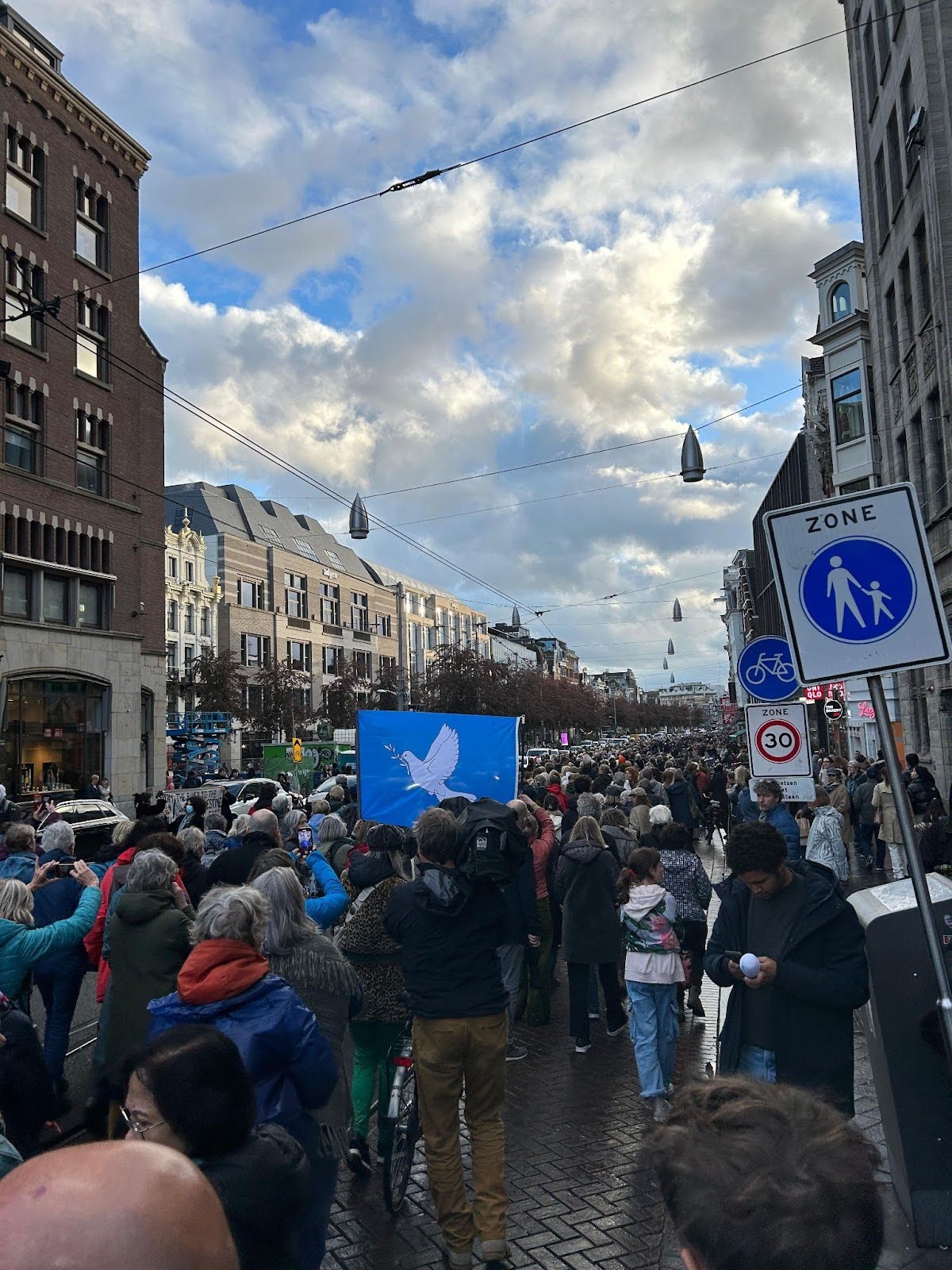
Photos from the peace protest.
On the Protests at Roeterseiland
“The demonstrations were very one-sided”, Orel explained. The Third Narrative is based on the assumption that there are a first and a second narrative. The first narrative means being completely pro-Israeli and ignoring or denying the suffering of Palestinians. The second narrative is what Orel saw at Roeterseiland: “Being pro-Palestine, ignoring the Jewish and Israeli people, and in most cases our mere existence”, as he described it.
“If you completely support either the first or the second narrative, you feed into the myth that it is either “us” or “them”, and therefore justify the war.”
To Orel, the Third Narrative means “that you don’t compromise any side’s rights”. Solely pro-Palestine protests on campus did not align with his views, so he stayed away. Yet as our conversation continued, I learned that this was not all. “It might take one a lifetime to understand all this, and we’re literally Israelis and Palestinians from the region. How many people do you think actually have the knowledge and the lived experience to handle crucial nuances, to not spread Islamophobia, antisemitism, anti-Israel or anti-Arab sentiment, or calls to compromise basic rights from any side?” Orel asked. Not knowing what to say, I responded with another question: did he think there was malicious intent? “Some just wait for an excuse to raise their voice and to speak against Jews or Muslims or immigrants or any other group. But that is the smallest group.” Orel believed it was more a problem of ignorance and entitlement. He thought many students were influenced by polarising Western media. “It’s just like, choose a side and go with it ‘til the end of their lives, you know? […] And then I see my friends chanting ‘from the river to the sea.’” He explained how endlessly complex this conflict was, and how important he thought lived experience was to truly understand the implications of what most students simply read on their smartphones. “What makes them think they are entitled to do that?” he asked when we spoke about the protests. And finally, Orel commented on the performative nature he sees in the activism on Roeterseiland and around the world. “When people meet an Israeli or a Jew these days, they immediately use that encounter to validate their political stances and opinions. In most cases, it’s not truly about us, Palestinians or Israelis. It is about those people wishing to feel good about themselves.”
“It’s not about us. It’s about themselves.”
As Orel saw it, students in the West went “from white supremacy to a white saviour complex. It’s two sides of the same coin.” I took note of this statement to revisit later, but first, I had another question.
“VIVA INTIFADA🇵🇸🇵🇸🇵🇸”
The invitations to the solidarity demonstration at Roeterseiland on May 9 were signed “VIVA INTIFADA🇵🇸🇵🇸🇵🇸”. I asked Orel how he felt about this.
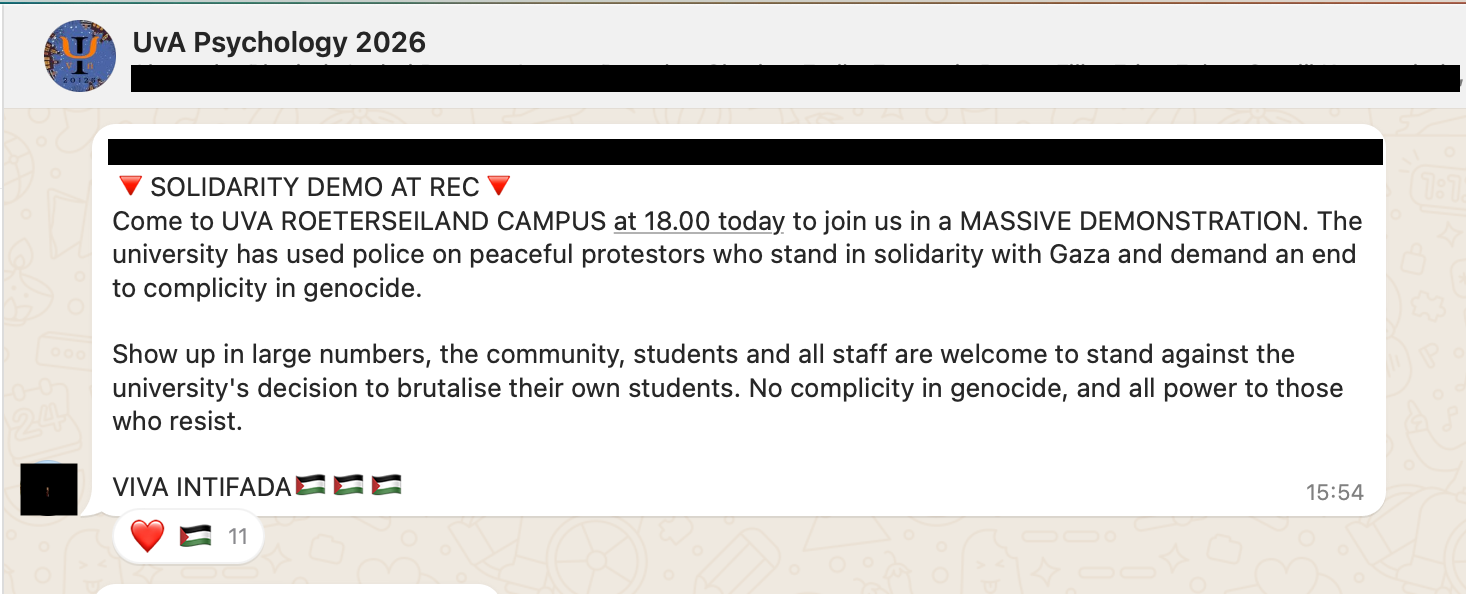
“I feel like they’re calling for the murder of Jews,” Orel responded briefly. He then elaborated, “When I was six years old, there was a huge boom in my neighbourhood, and it was echoing. And my mom came out of the balcony immediately, shouting to me and my brother to come upstairs. We were very little, 5-6 years old. It was the first time that my mom explained to us that we (Israeli-Jewish) civilians are targeted these days. A day later, in class, we were told that my classmate Yuval was missing because his aunt had been killed that day. It was a suicide attack. That was the Second Intifada. So that’s what I think of when I read this. That is what Israelis feel. “
Is it Anti-Semitism?
Finally, I asked the question that had surfaced in almost every conversation about the protests I had with Jewish students in the past few weeks: Did he think this was essentially anti-Semitism? Some students had argued they were against Zionists, but not Jewish people per se. Orel responded with a question of his own: Did I even know what I was asking? I soon learned I did not. “People don’t know what Zionism is”, he began. “Do you know how many streams there are under Zionism? It’s crazy […]. Of course, some modern groups use the term to amplify religious and nationalist ideas as much as Islamists do with Islam. But do you denounce the whole Islam?”. Given the complexity of the issue, Orel suggested: “Don’t talk about us without us. Ask Israelis what Zionism is for them”. According to Orel, this was not the only reason to include Israelis in the dialogue. He saw an important difference between education and lived experience. Though important, education did not equate to having lived through the conflict. “The West is so eager to be part of anything, to speak about it… Shortly, if you don’t have true Israeli-Palestinian partnerships leading these protests, you are doing something wrong”. He feared that polarised protests, led by students who had never been personally involved or failed to acknowledge one side of the conflict, would indeed result in anti-Semitism.
Already, Orel was seeing anti-Semitism, off and on our campus. “Look at the size, look at the international attention”, he said. Then he asked “How many people were there to protest against Russia when it attacked Ukraine? How long did the protests last? What about Iran, Afghanistan, or Sudan?”
“This gap exactly is where it comes down to something anti-Semitic.”
But he did not just see this happening on a worldwide scale, it also affected him in his private life. He told me that some acquaintances had started “talking to me like they’re posting social media right now”. “I am not my government”, he said. To illustrate his point, Orel shared a story about a friend he had met again after a long time. “She couldn’t listen to what happened to me and be with me in my pain, without validating her opinions of what is going on in Gaza (that I might or might not agree with)[…]. I told her what was going on in my life, with friends, and anti-Semitism. It wasn’t about the conflict at all. I am sitting with a friend, or so I feel, and whatever I say that does not include any political stance turns into ‘yeah, but look what’s going on in Gaza.
“When people talk to you, they basically tokenize you, immediately reducing you to whatever they’ve heard about Israel (and/or Palestine).”
I found my friends validating the anti-Semitic and anti-Israeli incidents I go through based on their political (and mostly euro-centric) stance on the war”
Feeling Safe on Campus
One question we try to ask all interviewees is how they have experienced being on campus during and after the protests. Whether they felt safe here. This time, however, I did not feel like I needed to ask. Throughout our interview, Orel had told me one story after the other. When I did ask him how he felt, he just said “I felt safe because I was strong enough about my opinion. I’m also from Israel and a peace activist”. Yet even on dating apps, strangers contact Orel just to send him messages saying things like “genocide” and “baby killer”. “They text me ‘no Zionist’, they text me ‘no dogs”, he recounted a few of these messages. In bars and at parties, people started acting aggressively towards him as soon as they realised that he was Israeli, he said. Orel also mentioned “I had to cut ties with a lot of friends”. Finally, he acknowledged that he might have felt safe on campus, but others did not. One of Orel’s friends had been asking people on campus what Zionism meant to them until she approached the wrong person. “Immediately, he started screaming at her”, Orel remembered the scene. “People gathered around her, someone called her ‘dirty Zionist’. She felt like she was going to have a panic attack. I immediately ran to her”.
Questions and Criticisms for the UvA
When I asked Orel my final question about questions and criticisms we should discuss with the UvA, he wrote the following to me: “As of now, it seems that the university does not take any hasty stand – and I can only appreciate it in times like these. Simultaneously, this is a great time to facilitate spaces for dialogues led by joint initiatives of Israelis and Palestinians who are experienced in giving the other side a face and promoting the notions of co-existence in the region. There is a huge opportunity for universities all over the world to show what is too often overshadowed in our region MENA: the vast sane majority just wants to live with respect, and dignity, in peace, and to stop feeding on the “it’s either us or them” myth. Our lives are no one’s football club.”
“Open the Gates”
Finally, I came back to Orel’s statement on performative activism. If not demonstrate, what were students supposed to do instead? Even if they had no lived experience in Israel and Palestine, what if they disagreed with their own government’s stance or actions, such as maintaining economic ties to Israel?
“The West is complicit in the biggest horrors we see these days. So now, when all sounds good for them, they want to choose sides? The West looks at us like a zoo. And they ask, oh what do you think should happen there?”. Therefore, Orel’s proposal for students who want to engage with the conflict in Israel and Palestine is the following:
“You know what your way to approach this should look like? Advocate for your government to open the gates for immigrants from the Middle East.”
I left this interview with much to think about. For days after meeting Orel, I thought about his perspective and his experiences, I discussed The Third Narrative with friends, and still, I just could not seem to find a conclusion. A week passed, and Orel was reviewing the interview. There, finally, in the comment section of the article’s first draft, I read the comment that I thought summed up the essence of our conversation. Orel had written:
“You don’t need to compromise one’s humanity to advocate for the other’s.”
Where to learn more:
Orel and his friend Ahmad Asly are currently collaborating on several projects to achieve the following: “Our vision is to contribute to The Third Narrative, in which the Israeli and Palestinian narratives reconcile toward a just and peaceful era for us all, Israelis and Palestinians, as we all deserve peace”.
If you are interested in learning more about Orel’s position and his projects, or perhaps you even want to reach out to him, have a look at this document.
Additionally, here is a source that Orel recommends:

https://www.allmep.org/
“That’s what we (Ahmad and I) believe in. It’s one of the NGOs we advise to follow on social media. But that’s also the more practical answer to ‘what, then, should people with no lived experience do?’”, Orel told me.
References
- ALLMEP. (2024, May 25). Home – Alliance for Middle East Peace. Alliance for Middle East Peace. https://www.allmep.org/
- Brym, R. J., & Araj, B. (2014, June 16). Intifada | History, Meaning, Cause, & Significance. Encyclopedia Britannica. https://www.britannica.com/topic/intifada
- Scully, E. (2016). Jerusalem’s Lost Etymology: How Augustine changed Latin Eschatology. Vigiliae Christianae/Vigiliae Christianae, 70(1), 1–30. https://doi.org/10.1163/15700720-12301029
- The Editors of Encyclopaedia Britannica. (2024, July 25). Zionism | Definition, History, Examples, & Facts. Encyclopedia Britannica. https://www.britannica.com/topic/Zionism
The Third Narrative. (2023, April 18). Home – the third narrative. https://thirdnarrative.org/
Statement from the author:
This article is part of a series on the pro-Palestine protests that recently happened on campus. The aim of this series is to give readers an insight into the events of the protests, and the different people and groups that were involved. I am aware that each individual has their own nuanced set of opinions and views on the protests, as well as on the conflict itself. I therefore want to ask you, the reader, to view this article as just one sample from a large pool of diverse individuals, that might not be representative of any group. Furthermore, I am not expert enough to comment on the truth of any of the statements made, and I did not write about them because they reflect my own opinion. Instead, I wrote this article because I believe that it is interesting and valuable to understand as many perspectives on these events as possible. While my questions and writing are shaped by my own biases, I worked closely with the interviewee to accurately reflect his views. Please understand this interview as an insight into the mind of someone involved in the protests, but not as a verified source on the Israel-Palestine conflict. If you are interested in more information about Orel’s views, you can find some sources he selected at the end of this article. Lastly, if after reading this article, there is anything you would like to discuss with me, or if you are interested in giving an interview yourself, you can reach me at lioba.roggendorf@gmail.com.
And now, please enjoy this article with a critical but open mind!
Orel Scheinin – The Third Narrative
Orel Scheinin is a RUG and UvA alumnus. Having recently graduated from his studies of Global Responsibility and Leadership, he is now an activist for the Third Narrative. Next to organising seminars to promote the Third Narrative and facilitate dialogue, he is working to provide education from a joint Palestinian and Israeli perspective, including speakers with lived experience from both sides.
I met Orel at a cafe near Leidseplein. He had let me know beforehand that he preferred meeting off-campus, and I would soon understand why. It was a sunny day. We found a table by the river, where the sound of rippling water, the aroma of cappuccino, and the occasional roar of motorcycles surrounded us. Orel asked how I liked Amsterdam, and somehow our chat ended up with me learning about the meanings of biblical words. Did you know that “Jerusalem” means “city of peace” in Hebrew (Scully, 2016)? Then, we started the interview.
The Third Narrative
My first question concerned Orel’s perspective on the conflict in general, and the protests specifically. “Shortly, my general stance on the conflict belongs to what we call ‘Peace Camp’ or ‘Third Narrative’”, he told me.
“I believe in the equal rights of 15 million people, from the river to the sea,”
“including Palestinians and Israelis, for everything. Including states. At least a two-state solution […]. Both should get recognition and equal status under the law, international law and the law they want to impose on themselves.” Orel also emphasised that this does not mean being uncritical of Israel’s government. “I have a lot of things to say about my government. I am a peace activist, middle-eastern (“Mizrahi”), and gay”. As an advocate for this perspective, Orel attended a recent peace protest. However, when I asked him whether he had joined any of the protests on our campus, he shook his head.


Photos from the peace protest.
On the Protests at Roeterseiland
“The demonstrations were very one-sided”, Orel explained. The Third Narrative is based on the assumption that there are a first and a second narrative. The first narrative means being completely pro-Israeli and ignoring or denying the suffering of Palestinians. The second narrative is what Orel saw at Roeterseiland: “Being pro-Palestine, ignoring the Jewish and Israeli people, and in most cases our mere existence”, as he described it.
“If you completely support either the first or the second narrative, you feed into the myth that it is either “us” or “them”, and therefore justify the war.”
To Orel, the Third Narrative means “that you don’t compromise any side’s rights”. Solely pro-Palestine protests on campus did not align with his views, so he stayed away. Yet as our conversation continued, I learned that this was not all. “It might take one a lifetime to understand all this, and we’re literally Israelis and Palestinians from the region. How many people do you think actually have the knowledge and the lived experience to handle crucial nuances, to not spread Islamophobia, antisemitism, anti-Israel or anti-Arab sentiment, or calls to compromise basic rights from any side?” Orel asked. Not knowing what to say, I responded with another question: did he think there was malicious intent? “Some just wait for an excuse to raise their voice and to speak against Jews or Muslims or immigrants or any other group. But that is the smallest group.” Orel believed it was more a problem of ignorance and entitlement. He thought many students were influenced by polarising Western media. “It’s just like, choose a side and go with it ‘til the end of their lives, you know? […] And then I see my friends chanting ‘from the river to the sea.’” He explained how endlessly complex this conflict was, and how important he thought lived experience was to truly understand the implications of what most students simply read on their smartphones. “What makes them think they are entitled to do that?” he asked when we spoke about the protests. And finally, Orel commented on the performative nature he sees in the activism on Roeterseiland and around the world. “When people meet an Israeli or a Jew these days, they immediately use that encounter to validate their political stances and opinions. In most cases, it’s not truly about us, Palestinians or Israelis. It is about those people wishing to feel good about themselves.”
“It’s not about us. It’s about themselves.”
As Orel saw it, students in the West went “from white supremacy to a white saviour complex. It’s two sides of the same coin.” I took note of this statement to revisit later, but first, I had another question.
“VIVA INTIFADA🇵🇸🇵🇸🇵🇸”
The invitations to the solidarity demonstration at Roeterseiland on May 9 were signed “VIVA INTIFADA🇵🇸🇵🇸🇵🇸”. I asked Orel how he felt about this.

“I feel like they’re calling for the murder of Jews,” Orel responded briefly. He then elaborated, “When I was six years old, there was a huge boom in my neighbourhood, and it was echoing. And my mom came out of the balcony immediately, shouting to me and my brother to come upstairs. We were very little, 5-6 years old. It was the first time that my mom explained to us that we (Israeli-Jewish) civilians are targeted these days. A day later, in class, we were told that my classmate Yuval was missing because his aunt had been killed that day. It was a suicide attack. That was the Second Intifada. So that’s what I think of when I read this. That is what Israelis feel. “
Is it Anti-Semitism?
Finally, I asked the question that had surfaced in almost every conversation about the protests I had with Jewish students in the past few weeks: Did he think this was essentially anti-Semitism? Some students had argued they were against Zionists, but not Jewish people per se. Orel responded with a question of his own: Did I even know what I was asking? I soon learned I did not. “People don’t know what Zionism is”, he began. “Do you know how many streams there are under Zionism? It’s crazy […]. Of course, some modern groups use the term to amplify religious and nationalist ideas as much as Islamists do with Islam. But do you denounce the whole Islam?”. Given the complexity of the issue, Orel suggested: “Don’t talk about us without us. Ask Israelis what Zionism is for them”. According to Orel, this was not the only reason to include Israelis in the dialogue. He saw an important difference between education and lived experience. Though important, education did not equate to having lived through the conflict. “The West is so eager to be part of anything, to speak about it… Shortly, if you don’t have true Israeli-Palestinian partnerships leading these protests, you are doing something wrong”. He feared that polarised protests, led by students who had never been personally involved or failed to acknowledge one side of the conflict, would indeed result in anti-Semitism.
Already, Orel was seeing anti-Semitism, off and on our campus. “Look at the size, look at the international attention”, he said. Then he asked “How many people were there to protest against Russia when it attacked Ukraine? How long did the protests last? What about Iran, Afghanistan, or Sudan?”
“This gap exactly is where it becomes down to something anti-Semitic.”
But he did not just see this happening on a worldwide scale, it also affected him in his private life. He told me that some acquaintances had started “talking to me like they’re posting social media right now”. “I am not my government”, he said. To illustrate his point, Orel shared a story about a friend he had met again after a long time. “She couldn’t listen to what happened to me and be with me in my pain, without validating her opinions of what is going on in Gaza (that I might or might not agree with)[…]. I told her what was going on in my life, with friends, and anti-Semitism. It wasn’t about the conflict at all. I am sitting with a friend, or so I feel, and whatever I say that does not include any political stance turns into ‘yeah, but look what’s going on in Gaza.
“When people talk to you, they basically tokenize you, immediately reducing you to whatever they’ve heard about Israel (and/or Palestine).”
I found my friends validating the anti-Semitic and anti-Israeli incidents I go through based on their political (and mostly euro-centric) stance on the war”
Feeling Safe on Campus
One question we try to ask all interviewees is how they have experienced being on campus during and after the protests. Whether they felt safe here. This time, however, I did not feel like I needed to ask. Throughout our interview, Orel had told me one story after the other. When I did ask him how he felt, he just said “I felt safe because I was strong enough about my opinion. I’m also from Israel and a peace activist”. Yet even on dating apps, strangers contact Orel just to send him messages saying things like “genocide” and “baby killer”. “They text me ‘no Zionist’, they text me ‘no dogs”, he recounted a few of these messages. In bars and at parties, people started acting aggressively towards him as soon as they realised that he was Israeli, he said. Orel also mentioned “I had to cut ties with a lot of friends”. Finally, he acknowledged that he might have felt safe on campus, but others did not. One of Orel’s friends had been asking people on campus what Zionism meant to them until she approached the wrong person. “Immediately, he started screaming at her”, Orel remembered the scene. “People gathered around her, someone called her ‘dirty Zionist’. She felt like she was going to have a panic attack. I immediately ran to her”.
Questions and Criticisms for the UvA
When I asked Orel my final question about questions and criticisms we should discuss with the UvA, he wrote the following to me: “As of now, it seems that the university does not take any hasty stand – and I can only appreciate it in times like these. Simultaneously, this is a great time to facilitate spaces for dialogues led by joint initiatives of Israelis and Palestinians who are experienced in giving the other side a face and promoting the notions of co-existence in the region. There is a huge opportunity for universities all over the world to show what is too often overshadowed in our region MENA: the vast sane majority just wants to live with respect, and dignity, in peace, and to stop feeding on the “it’s either us or them” myth. Our lives are no one’s football club.”
“Open the Gates”
Finally, I came back to Orel’s statement on performative activism. If not demonstrate, what were students supposed to do instead? Even if they had no lived experience in Israel and Palestine, what if they disagreed with their own government’s stance or actions, such as maintaining economic ties to Israel?
“The West is complicit in the biggest horrors we see these days. So now, when all sounds good for them, they want to choose sides? The West looks at us like a zoo. And they ask, oh what do you think should happen there?”. Therefore, Orel’s proposal for students who want to engage with the conflict in Israel and Palestine is the following:
“You know what your way to approach this should look like? Advocate for your government to open the gates for immigrants from the Middle East.”
I left this interview with much to think about. For days after meeting Orel, I thought about his perspective and his experiences, I discussed The Third Narrative with friends, and still, I just could not seem to find a conclusion. A week passed, and Orel was reviewing the interview. There, finally, in the comment section of the article’s first draft, I read the comment that I thought summed up the essence of our conversation. Orel had written:
“You don’t need to compromise one’s humanity to advocate for the other’s.”
Where to learn more:
Orel and his friend Ahmad Asly are currently collaborating on several projects to achieve the following: “Our vision is to contribute to The Third Narrative, in which the Israeli and Palestinian narratives reconcile toward a just and peaceful era for us all, Israelis and Palestinians, as we all deserve peace”.
If you are interested in learning more about Orel’s position and his projects, or perhaps you even want to reach out to him, have a look at this document.
Additionally, here is a source that Orel recommends:

https://www.allmep.org/
“That’s what we (Ahmad and I) believe in. It’s one of the NGOs we advise to follow on social media. But that’s also the more practical answer to ‘what, then, should people with no lived experience do?’”, Orel told me.
References
- ALLMEP. (2024, May 25). Home – Alliance for Middle East Peace. Alliance for Middle East Peace. https://www.allmep.org/
- Brym, R. J., & Araj, B. (2014, June 16). Intifada | History, Meaning, Cause, & Significance. Encyclopedia Britannica. https://www.britannica.com/topic/intifada
- Scully, E. (2016). Jerusalem’s Lost Etymology: How Augustine changed Latin Eschatology. Vigiliae Christianae/Vigiliae Christianae, 70(1), 1–30. https://doi.org/10.1163/15700720-12301029
- The Editors of Encyclopaedia Britannica. (2024, July 25). Zionism | Definition, History, Examples, & Facts. Encyclopedia Britannica. https://www.britannica.com/topic/Zionism
The Third Narrative. (2023, April 18). Home – the third narrative. https://thirdnarrative.org/

